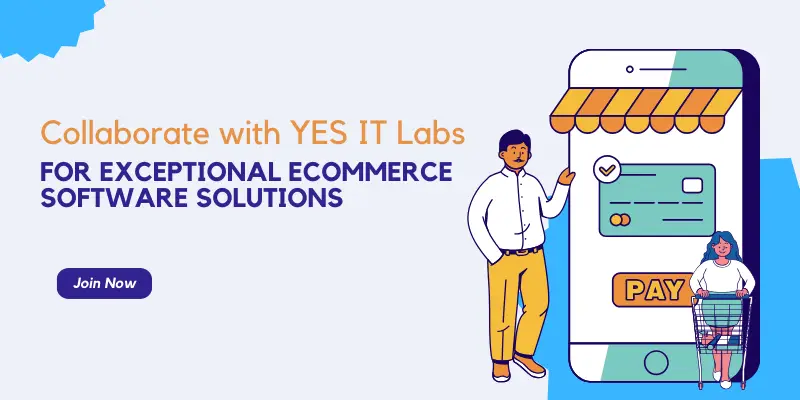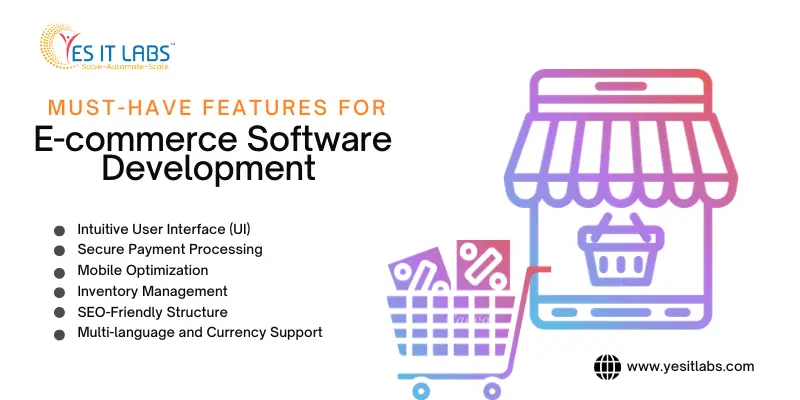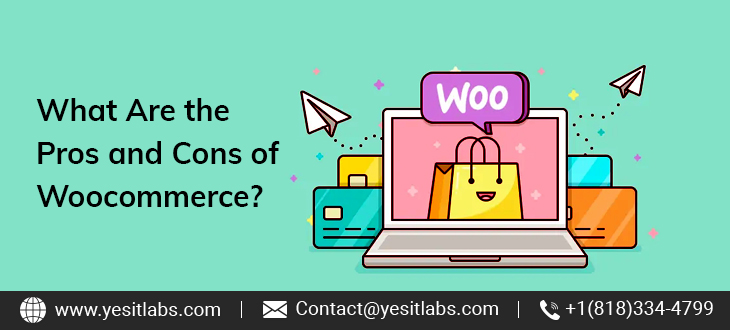 By Admin
By Admin E-commerce Software Development: Everything You Must Know
Introduction
In today’s digital age, the world of commerce has shifted significantly towards the online realm. E-commerce has become a cornerstone for businesses of all sizes, offering a global marketplace and unparalleled convenience for both buyers and sellers. If you’re considering venturing into the world of online retail or upgrading your existing platform, understanding the intricacies of e-commerce software development is crucial. In this blog post, we’ll explore everything you need to know about e-commerce software development services, answering common questions and shedding light on essential aspects.
The eCommerce industry has experienced remarkable growth over the past few decades, witnessing a significant surge since the launch of popular digital storefronts such as Amazon and eBay. Surpassing an impressive milestone, the revenue in the eCommerce market has now exceeded US$3 trillion.
An astonishing fact further emphasizes the industry’s robustness, with a Compound Annual Growth Rate (CAGR) of 23%. This data underscores the vast size of the eCommerce market and its potential for substantial growth.
These encouraging statistics have spurred numerous entrepreneurs to invest in eCommerce development. Given the dynamic nature of customer demands, purchasing behaviors, and technological advancements, the creation of web-based commerce software has become a requisite in today’s business landscape.
By embracing eCommerce application development, entrepreneurs can tap into the extensive profits offered by the burgeoning online retail sector. With the anticipated proliferation of virtual marketplaces in the coming years, investing in eCommerce application development now positions businesses to reap substantial rewards.
Behind every online retail website lies powerful software that adeptly manages the intricacies of backend operations. This eCommerce software acts as the engine running processes to handle payments, orders, security, inventory, and overall functionalities of an online store.
For those contemplating the development of eCommerce software, this guide serves as a comprehensive resource, providing all the necessary knowledge to kickstart your venture. Let’s embark on this journey together and delve into the world of eCommerce software development!
What is E-commerce Software Development?
Before we dive into the nitty-gritty details, let’s understand what e-commerce software development is all about. In essence, it involves the creation and customization of software solutions tailored to meet the specific needs of online businesses. These solutions empower businesses to establish and manage their online presence, streamline operations, and provide a seamless shopping experience for customers.
What Software to Use for E-commerce?
Choosing the right software is a pivotal decision when delving into e-commerce. There are several platforms available, each with its unique features and functionalities. Some popular choices include Shopify, WooCommerce, Magento, and BigCommerce. The selection should align with your business requirements, budget, and scalability plans.
Shopify, for example, is an excellent choice for startups and small businesses due to its user-friendly interface and quick setup. On the other hand, Magento is known for its robustness and scalability, making it suitable for larger enterprises. WooCommerce, a WordPress plugin, seamlessly integrates with existing websites, providing flexibility for businesses with an established online presence.
What Does E-commerce Software Do?
E-commerce software serves as the backbone of your online store, handling various crucial aspects of your business. Here’s a glimpse into what these software solutions can do:
- Product Management: Efficiently manage your product catalog, including adding, editing, and removing items. This includes features like categorization, pricing, and inventory management.
- Order Processing: Streamline the entire order fulfillment process, from order placement to payment processing, and finally, shipping. Automation of these tasks ensures a smooth customer experience.
- Payment Gateway Integration: Facilitate secure online transactions by integrating reliable payment gateways. This builds trust among customers and ensures the security of sensitive information.
- User Authentication and Security: Implement robust security measures to protect user data and ensure secure transactions. User authentication features help in creating a safe and trustworthy online environment.
- Mobile Responsiveness: With the rising trend of mobile commerce, e-commerce software should be optimized for various devices, providing a seamless experience across smartphones, tablets, and desktops.
How Much Does E-commerce Software Development Cost?
The cost of e-commerce software development can vary significantly based on factors such as the chosen platform, features required, and the complexity of the project. For a basic online store setup using platforms like Shopify or WooCommerce, the costs may be relatively lower, starting from a few hundred to a couple of thousand dollars.
However, for more complex and custom solutions, especially for large-scale enterprises, the costs can escalate into tens of thousands of dollars. It’s crucial to carefully consider your business needs and budget constraints when embarking on an e-commerce software development journey. Investing wisely in the right features and scalability can result in long-term benefits and cost savings.
Must-Have Features for E-commerce Software Development
Building a successful online store involves incorporating essential features that enhance user experience and streamline business operations. Here are some must-have features for e-commerce software development:
- Intuitive User Interface (UI): A user-friendly interface ensures that customers can easily navigate through your online store, find products, and make purchases without confusion.
- Secure Payment Processing: Prioritize the integration of secure and widely trusted payment gateways to instill confidence in customers regarding the safety of their financial transactions.
- Mobile Optimization: As mobile commerce continues to rise, ensure that your e-commerce software is optimized for various devices, providing a seamless experience across different screen sizes.
- Inventory Management: Efficiently manage your product catalog, track inventory levels in real-time, and receive alerts for low stock to prevent overselling.
- SEO-Friendly Structure: Implementing best practices SEO services for your e-commerce platform ensures better visibility in search engine results, driving organic traffic to your online store.
- Multi-language and Currency Support: If targeting an international audience, providing support for multiple languages and currencies is essential for a personalized and global shopping experience.

Collaborate with YES IT Labs for Exceptional eCommerce Software Solutions
Creating eCommerce software that distinguishes itself from competitors and resonates with your target audience is a key factor in achieving success in the fiercely competitive realm of virtual marketplaces. Recognizing the significance of a reliable tech partner in eCommerce software development is crucial.
Having online retail software that aligns with your business objectives and facilitates growth is essential for ensuring a sustainable future. YES IT Labs is a trusted software development company that you can depend on to craft outstanding eCommerce solutions.
Our proficiency extends to developing cutting-edge online retail software using a variety of technologies and platforms, including Shopify and Magento. Leverage our expertise to build next-generation virtual marketplaces. Contact us now to get started.
In conclusion, e-commerce software development services are the gateway to establishing and growing a successful online business. Whether you’re a small startup or a large enterprise, choosing the right software, understanding its functionalities, and incorporating essential features are crucial steps in ensuring a robust and competitive online presence. By asking the right questions and staying informed, you can embark on a successful e-commerce journey that meets the demands of today’s dynamic digital marketplace.
Tags: ecommerce development company, ecommerce software development company, ecommerce software development services, hire Shopify developers, WooCommerce development, woocommerce development servicesLatest Resources
Top Frameworks for Cross-Platform App Development in 2025
January 22, 2025
A Guide to Types of Artificial Intelligence (AI)
January 14, 2025
Key Benefits of React Native App Development
January 7, 2025
Leveraging AI in Startup Software Development: Trends and Tips
December 30, 2024
Mobile Optimization for Shopify Apps: Best Practices
December 23, 2024













 Services
Services

